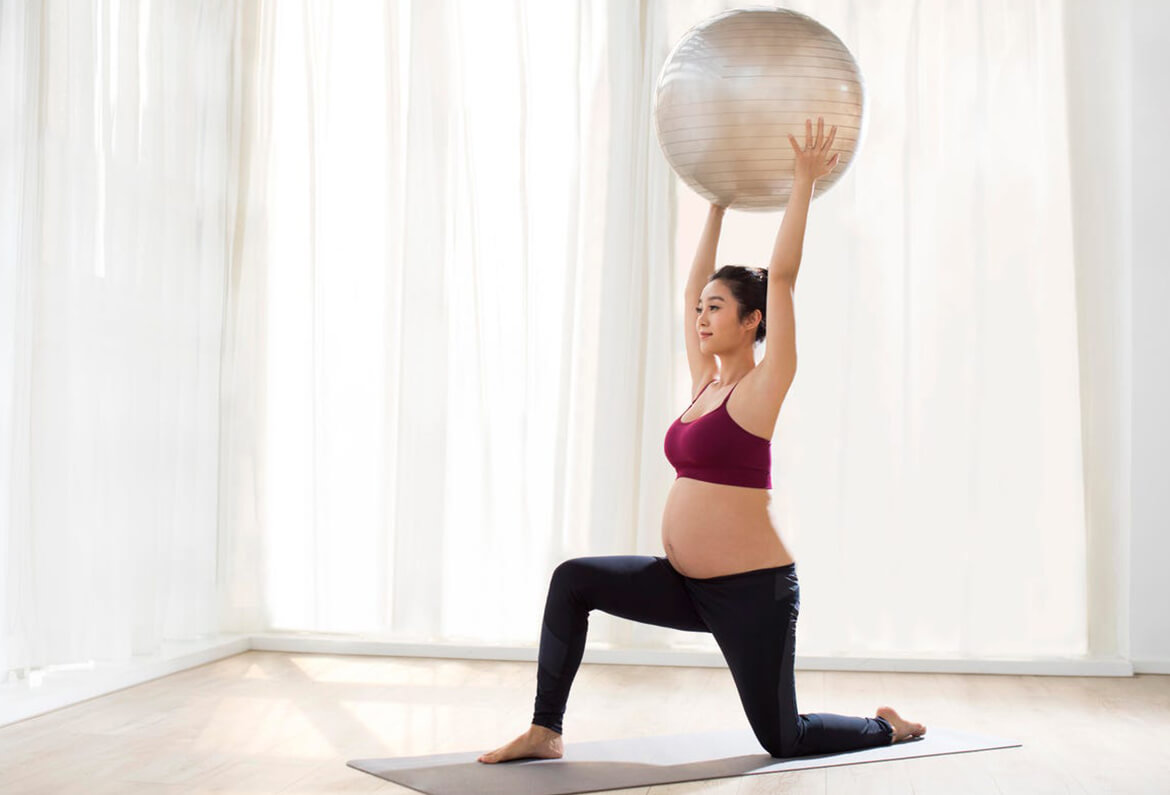The Importance of Regular Exercise During Pregnancy
Pregnancy is a beautiful journey that lasts for nine months and is filled with excitement, joy, and anticipation. As the body changes and the baby grows, the pregnant woman experiences a range of emotions and physical sensations that are unique to this special time. The beauty of pregnancy lies in the creation of new life and the bond that forms between the mother and the unborn child. Each trimester brings new developments and milestones and watching the baby grow, and change is a source of wonder and amazement. The glow of pregnancy, the joy of feeling the baby’s movements, and the excitement of preparing for the arrival of a new family member all contribute to the beauty of this journey. Despite the challenges and discomforts that come with pregnancy, the nine months spent preparing for the arrival of a new life are truly magical and beautiful.
In this blog, we are going to discuss the importance of regular exercise during pregnancy.
Exercising during pregnancy is important for maintaining physical and mental health. It helps to alleviate common discomforts such as back pain and fatigue, promotes healthy weight gain, and improves mood and sleep quality. Regular exercise also prepares the body for labour and delivery and can improve overall fitness and recovery post-delivery. It is important to consult with a doctor and follow a safe exercise plan tailored to individual needs and pregnancy.
Benefits of Regular Exercise During Pregnancy
This is how regular exercise during pregnancy helps you to be healthy and active.
Maintains physical health: Regular exercise during pregnancy helps to maintain overall physical health and can alleviate common discomforts such as back pain, fatigue, and swelling.
Promotes healthy weight gain: Exercise can help control weight gain and promote healthy weight management during pregnancy.
Improves mental health: Exercise has been shown to improve mood, reduce stress and anxiety, and promote overall mental well-being during pregnancy.
Prepares the body for labour and delivery: Regular exercise during pregnancy can strengthen muscles and improve cardiovascular health, helping to prepare the body for labour and delivery.
Supports postpartum recovery: Exercise during pregnancy can improve overall fitness and help the body recover more quickly after delivery. It can also help prevent postpartum depression and improve mood and energy levels.
Easy Exercises to Minimise the Discomforts of Pregnancy
Here are some exercises you can follow comfortably during pregnancy:
Walking: Walking is a gentle and low-impact exercise that is safe for pregnant women at any stage of pregnancy. It helps to improve cardiovascular health, maintain mobility, and reduce stress and anxiety.
Prenatal yoga: Prenatal yoga is a safe and effective way to stay active and improve flexibility and strength during pregnancy. It also helps to promote relaxation and reduce stress.
Swimming: Swimming is an excellent full-body workout that is safe for pregnant women. The buoyancy of the water supports the body and helps reduce joint stress.
Stationary cycling: Stationary cycling is a low-impact exercise that is safe for pregnant women and helps to improve cardiovascular health and maintain fitness.
Strength training: Light strength training exercises, such as weightlifting or resistance band exercises, can help to maintain muscle tone and strength during pregnancy. It is important to consult with a doctor and a trainer before starting any strength training routine during pregnancy.

What to do if you have complications after regular exercising during pregnancy?
If you have some complications and are not able to follow a regular, more serious exercising routine, it is important to find alternative ways to stay active and healthy.
Here is how you can do that:
Gentle stretching and relaxation exercises: Stretching and relaxation exercises can help to reduce stress, improve flexibility, and maintain mobility during pregnancy.
Light household activities: Light household activities such as cleaning, cooking, and gardening can help to keep you active and promote physical well-being.
Prenatal massage: Prenatal massage can help to relieve muscle tension, reduce stress and anxiety, and improve circulation during pregnancy.
Walking: Walking is a simple and effective way to stay active and improve cardiovascular health during pregnancy.
Water activities: Activities such as swimming or water aerobics can provide a low-impact workout and help to maintain fitness during pregnancy.
It is important to consult with an experienced gynaecologist in Delhi and receive personalised guidance on safe activities and exercise modifications for your individual needs and pregnancy. Staying active and healthy is important for the well-being of both the mother and the growing baby.
There is one more important point to understand. The type and intensity of exercise should be modified based on the trimester of pregnancy and the individual needs and health status of the mother. Each trimester represents a certain kind of growth for the fetus. Not following the trimester-specific exercise routine may lead to risk and complications.
Here are some general exercise tips for each trimester of pregnancy:
1st Trimester (Weeks 1-12):
- During the first trimester, the focus should be on maintaining physical activity levels rather than increasing them.
- Light activities such as walking, prenatal yoga, and stretching exercises are safe and effective options.
- Avoid activities that have a high risk of falling or abdominal injury, such as contact sports or high-impact aerobics.
2nd Trimester (Weeks 13-28):
- During the second trimester, the body may experience increased weight and balance changes, making it more difficult to engage in certain activities and increasing discomfort in pregnancy.
- Light to moderate intensity activities such as prenatal yoga, swimming, and stationary cycling are safe and effective options.
- Avoid activities that involve pressure on your uterus, such as crunches or sit-ups.
3rd Trimester (Weeks 29-40):
- During the third trimester, the focus should be on maintaining physical activity levels rather than increasing them.
- Gentle activities such as walking, prenatal yoga, and light strength training exercises during pregnancy are safe and effective options.
- Avoid activities that involve jumping, bouncing, or sudden movements, as these can increase the risk of preterm labour.
During the 9th month of pregnancy, the focus of exercise shifts towards preparing the body for labour and delivery. Here are some exercises that can be done during the 9th month of pregnancy to help prepare for vaginal delivery:
Kegels: Kegel exercises involve contracting and relaxing the pelvic floor muscles, which can help strengthen the muscles used during delivery and improve bladder control.
Pelvic tilts: Pelvic tilts involve tilting the pelvis forward and backwards while standing or on all fours. It can help improve the alignment of the pelvis and encourage the baby to move into a favourable position for delivery.
Squats: Squats can help strengthen the muscles of the legs and pelvic floor and can also help open up the pelvis to make more room for the baby to descend during delivery.
Cat-Cow stretch: This involves moving between a position where the back is arched (cow) and a position where the back is rounded (cat) while on all fours. It can help improve flexibility in the spine and pelvis.
Walking: Regular walking can help improve cardiovascular fitness, strengthen the muscles used during delivery, and encourage the baby to descend into the pelvis.
It’s important to discuss any exercise program or discomfort in pregnancy with an experienced gynaecologist, especially in the 9th month of pregnancy.
Again, it is equally important to consult with a gynaecologist and receive personalised guidance on safe exercise practices during each trimester. Factors such as pre-existing medical conditions, the health of the pregnancy, and individual preferences should be taken into consideration when creating a safe and effective exercise routine during pregnancy.
If you experience discomfort in pregnancy after exercising, it is important to address it promptly and take the necessary steps to alleviate the symptoms.
We are listing down some important steps to take if you feel uncomfortable before, after, or during the pregnancy exercises.
Rest: If you feel tired or fatigued after exercising, it is important to rest and give your body time to recover.
Hydration: Staying hydrated is important for maintaining physical health and reducing discomfort after exercising.
Cool down: After exercising, it is important to cool down by doing gentle stretches or relaxation exercises to help the body recover and reduce muscle soreness.
Ice or heat therapy: If you experience muscle pain or soreness after exercising, you may find relief through ice or heat therapy. Ice can help to reduce inflammation and swelling, while heat can help to soothe muscle aches and improve circulation.
Pain medication: If necessary, you can use over-the-counter pain medication such as acetaminophen to relieve discomfort. It is important to consult with a doctor before taking any medication during pregnancy.
It is also important to listen to your body and modify your exercise routine if you experience any discomfort or pain. If symptoms persist, it is best to consult with a doctor for a proper evaluation and personalised treatment plan.

Conclusion
Regular exercise during pregnancy is essential for both the mother and the developing baby. It helps to maintain a healthy weight, reduces stress, improves sleep, and reduces the risk of gestational diabetes and hypertension. Regular physical activity can also boost energy levels, enhance mood, and increase muscle strength and endurance, which can help to prepare the body for labour and delivery. Furthermore, exercise has been shown to have a positive impact on the fetus, promoting healthy growth and development. In conclusion, it is highly recommended for pregnant women to engage in regular, moderate exercise under the guidance of their healthcare provider to ensure a healthy pregnancy and a successful delivery.
If you are going through the family way and want your journey to be smooth and free of complications, consult with Dr. Rhythm Gupta, one of the best, most trusted gynaecologists in Delhi, India. She understands a woman’s emotions, physical journey, and discomforts of pregnancy very well and, thus, prescribes the right and personalised route to make the journey easy and fulfilling, leading to a natural delivery.












